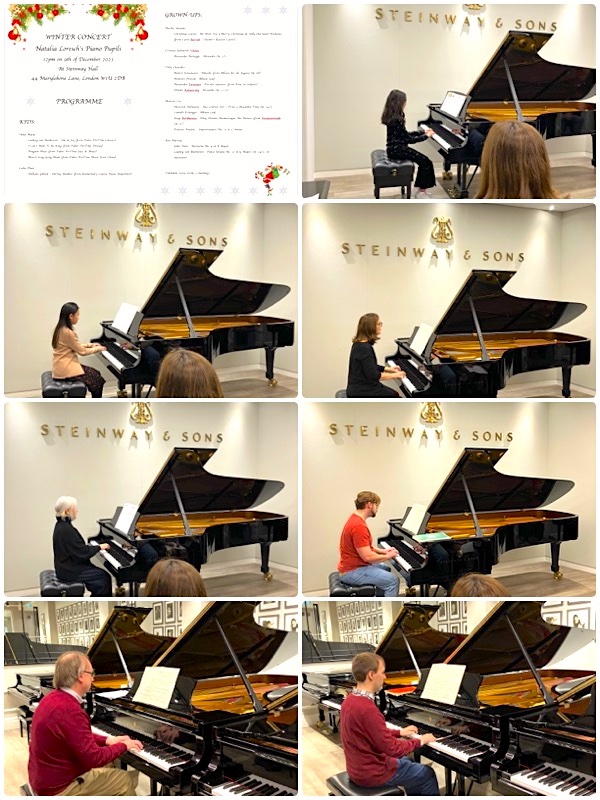Piano Lessons for Advanced Pupils
As Heinrich Neuhaus wrote, "every performance … consists of three fundamental elements: the work performed (the music), the performer and the instrument. Only a complete mastery of these three elements (and first of all, the music) can ensure a good artistic performance." Much learning and time would need to be invested into materialising this combination - studying music history, biographical backgrounds and styles, piano technique in the context of individual human anatomy, psychology and experience, and understanding how the piano works as keyboard instrument. But it is an exciting learning adventure and, when it is made to work, a wonderful musical and human experience.
From the latest Piano Pupils' Concert at Steinway Hall London:
Advanced students will:
🎵 Learn to challenge themselves in order to achieve the best possible results.
🎵 Learn to discover or nurture the joy of music and play with a spark.
🎵 Learn to advance their technical skills systematically by addressing and solving existing problems in a systematic way, clarifying their understanding of technical concepts and connecting them to realisations though exercises and repertoire in general. As Sergei Rachmaninov (one the greatest composers and pianists of the 20th century with a phenomenal technique) wrote in 1917, "Personally, I believe this matter of insisting upon a thorough technical knowledge is a very vital one. The mere ability to play a few pieces does not constitute musical proficiency. It is like those music boxes which possess only a few tunes, The student's technical grasp should be all-embracing."
In James Francis Cooke's Great Pianists on Piano Playing
🎵 Develop pedalling skills.
🎵 Develop mental clarity and learn to play with accuracy.
🎵 Learn to free themselves from existing tension.
🎵 Learn to play without pain, solve existing physical problems caused by injuries in the past or a harmful way of playing/practising in general and also to prevent future problems.
🎵 Learn to develop a rich, beautiful and varied sound without unnecessary hammering.
🎵 Learn to play with and without arm weight depending on repertoire.
🎵 Learn to understand how effective fingering works and how to select fingerings individually.
🎵 Learn or improve memorization skills (if relevant in individual or performance context). The value of memorisation consists not only in mental discipline and the analytic approach which brings a much more detailed grasp of a piece as well as deeper understanding through deepened study but also physical/musical benefits which free the player from the necessity of constantly having to follow the notes in the score. As Felix Le Couppey writes, "there is a certain degree of progress, a certain development of musical faculties that will never be attained by one not in the habit of playing from memory. The constant preoccupation of following the notes with the eyes, invariably injures the development of perfection… . Freed from this preoccupation, the player identifies himself more completely with the work he interprets; he has a firmer grasp of its character, its style, its colour, in fact, he plays more artistically. For this type of study, when the taste is refined, when the musical feeling is elevated and strengthened he can have more perfect command over himself, can be absorbed, listen to the tone of this note, or watch the touch of that, can give himself entirely up, to restrain himself, and become wrapped in what he plays, like the actor in his role. To allow free play of the imagination, to bring out the melody that is felt in the soul [E'l cantor che neli anima si sente - Petrarque], to permit the heart to be moved, to reach to the ideal of a fine interpretation, must not the thought be disengaged from all outside fetters?" Memorization also allows the player to perform a piece spontaneously in social contexst without having to carry the music to all gatherings whenever asked.
🎵 Learn to set realistic goals and realise them.
🎵 Gradually build up and expand a performance repertoire which is realistic and skill-wise within reach. Progress gradually while advancing skills and experience, enjoying "harder" music by listening while you are getting there.
🎵 Learn to understand how effective practice works, establishing fundamental principles, processes, methods and structured planning. As the famous French piano pedagogue and composer of many pieces for beginning as well as advanced learners wrote, "everything lies in knowing how to practise." (Felix Le Couppey Piano Teaching. Advice to Pupils and Young Teachers)
🎵 Study music history and connect it to the repertoire studied.
🎵 Advance their understanding of different musical styles and learn to develop logical but individual interpretations.
🎵 Incorporate harmonic, contrapuntal and formal analysis into interpretation.
🎵 Be encouraged to expand their knowledge of philosophy, religions (where applicable), other arts, literature and especially poetry - the latter two being the most directly related areas of interest. It would be absolutely impossible to attempt to understand Schumann without familiarising oneself with E.T.A. Hoffman, Tchaikovsky without Tolstoy, Bach without the Bible and Lutheranism, Beethoven without Hegel, Scriabin without various kinds of mystic writings, silver age poetry and German idealism, or Debussy without Baudelaire and Monet etc. Without a constant improvement of general and musical culture, the qualities of independence, intellectual thinking and freedom of well-informed personal opinion musical studies would loose their gist.
🎵 Develop a holistic understanding of a composer's oeuvre which would also need to be built on a good knowledge of his works, time in history, and culture in general. When playing a Beethoven sonata, for example, study all other sonatas and also other works composed within roughly speaking the same period of creativity and life experience. Or when learning a prelude of fugue from Bach's Well-Tempered Clavier analyse it and look at all other preludes and fugues as well; read books about the whole collection and research composition and performance practices of the time, studying the functionings of early keyboard instruments and reading books on counterpoint, even exploring the option to study counterpoint and write fugues. Ask yourself the question - why was a composer writing in the way in which he or she was writing? What made his/her language and what was conveyed through the music?
🎵 Learn to think independently and critically in a non-destructive way.
🎵 Learn to listen to music in an informed way.
🎵 Develop a confident way of playing.
🎵 Learn to deal with performance anxiety and further piano-related fears.
🎵 Effectively prepare for grade exams, diplomas, auditions, festivals, competitions, concerts or any other performances aiming at earning distinctions and top prizes.
🎵 Learn with a practising pianist and hear professional demonstrations of repertoire studied in lessons. Pupils learn much faster and much more efficiently when they see/hear that and how the seemingly unsurmountable difficulties of new steps and challenges can be easily dealt with. Complementing verbal explanations with actual playing not only speeds up progress but also gives pupils performance and artistic skills which cannot be acquired through words only.
🎵 Be welcome to participate in Piano Hours which provide a friendly non-competitive non-public performance environment in which pupils not only play themselves but also learn to formulate constructive critical feedback to help others; pupils often make friends with each other and tea/coffee/cake are always provided.
🎵 Learn the art of performance through performances opportunities such as festivals and competitions which are a great way to find your way of playing piano in public and your own voice in it. Try out various opportunities to learn to share a spark through your playing. Playing on different pianos in different spaces is a matter of practice which with a certain quantity would enable you to adjust to various pianos and acoustics more effectively and faster. It also helps to develop a presence in space without which musical performances do not really work. Also consider participating in online events through recordings which are a fantastic way of improving your playing and building up a collection of your performances.
🎵 Prepare for university and music college.
.
🎵 Have access to a lending library.
Please read the Ethos & Values page for an overall description.
Requirements for Starting Piano Lessons:
🎵 Pupils' own interest in music (and in this case particularly in learning piano) and willingness to practise.
🎵 Transfer pupils of any age and level might require an overhaul of technical/reading skills without which lessons would not make sense; for this to work pupils would need patience to fill existing technical gaps which takes time and cannot be done in a few weeks.
🎵 The orientation is 100% results; the aiming-at-the-minimum-quality (pass mark) approach with three pieces per grade is not practised; switching from the latter to the former may take time since it involves a redevelopment of skills.
🎵 Willingness to behave appropriately is an absolute must. Inappropriate behaviour is highly disrespectful, its continuation will not be tolerated and lessons may be terminated. Please check the Teaching Ethos page for further details.
📖 "Patience and exactitude are the main conditions for success…" Marie Prentner Leschetizky's Fundamental Principles of Piano Technique
Pupils Playing in Advanced Piano Lessons:
Marcus plays Heinrich Hofmann's Aus schöner Zeit Op. 34/3 at Steinway Hall, London
Marina plays Mendelssohn's Goldellied at Bluthner Piano Centre, London Mayfair
Marina plays Wagner's Ankunft bei den schwarzen Schwänen in Hither Green, South East London
👉 Find many more pupils' recordings on the Media Pages
Book a Consultation Piano Lesson
Get in touch with a request by calling, sending a message or emailing:
☎️ +44 (0) 7454766539
📮 contact@pianolessons-london.co.uk
Piano Lessons London | Online Piano Lessons | Piano Teacher Bio | About Lessons | Piano Lessons for Beginners | Advanced Piano Lessons | Piano Lessons for Kids | Piano Lessons for Adults | Locations | Fees & Discounts | Results | Ethos | Music Library | FAQ | Performance | Piano Hours | Teaching Schedule | News | Media | Links | Reviews | Policy | Blog | Materials | Contact
 Piano Lessons in London & Online | Natalia Loresch | Beginners | Advanced | Professionals ☎️+44(0)7454766539
Piano Lessons in London & Online | Natalia Loresch | Beginners | Advanced | Professionals ☎️+44(0)7454766539